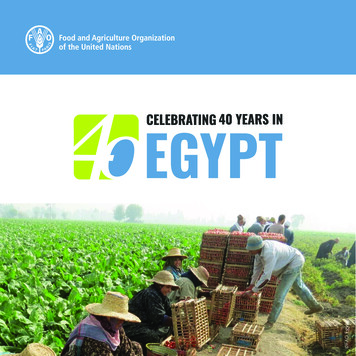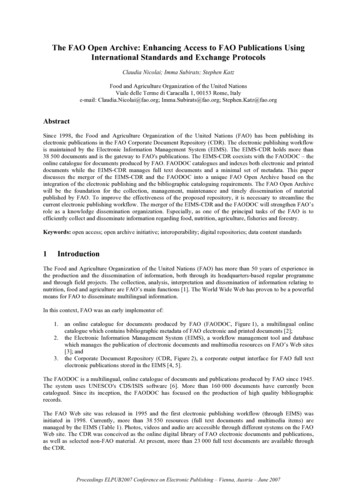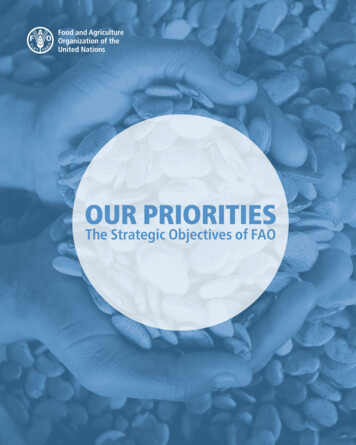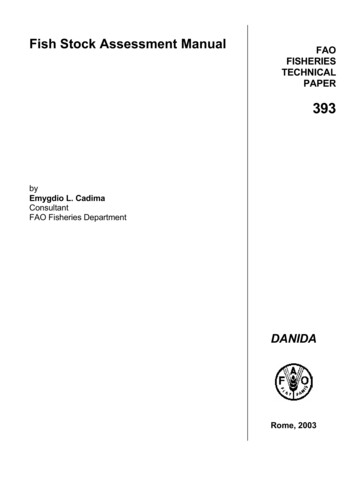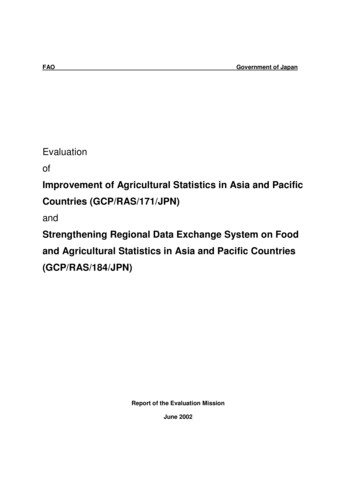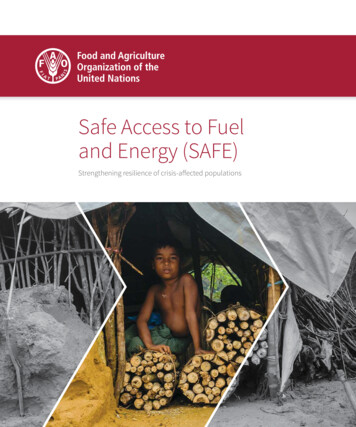
Transcription
OECD‑FAO Guidancefor Responsible AgriculturalSupply Chains
OECD FAO Guidancefor ResponsibleAgricultural SupplyChains
This document and any map included herein are without prejudice to the status of orsovereignty over any territory, to the delimitation of international frontiers and boundariesand to the name of any territory, city or area. The names of countries and territories usedin this joint publication follow the practice of the FAO.Please cite this publication as:OECD/FAO (2016), OECD-FAO Guidance for Responsible Agricultural Supply Chains, OECD 251052-enISBN 978-92-64-25095-6 (print)ISBN 978-92-64-25105-2 (PDF)FAO :ISBN 978-92-5-109395-5 (print and PDF)The statistical data for Israel are supplied by and under the responsibility of the relevant Israeli authorities. The useof such data by the OECD is without prejudice to the status of the Golan Heights, East Jerusalem and Israelisettlements in the West Bank under the terms of international law.Photo credits: Cover pink cotton candy/iStock/Thinkstock.comCorrigenda to OECD publications may be found on line at: ight: OECD, FAO 2016You can copy, download or print OECD content for your own use, and you can include excerpts from OECD publications, databases andmultimedia products in your own documents, presentations, blogs, websites and teaching materials, provided that suitableacknowledgment of OECD and FAO as source and copyright owner is given. All requests for public or commercial use and translation rightsshould be submitted to rights@oecd.org. Requests for permission to photocopy portions of this material for public or commercial use shallbe addressed directly to the Copyright Clearance Center (CCC) at info@copyright.com or the Centre français d'exploitation du droit de copie(CFC) at contact@cfcopies.com.
FOREWORDForewordThe OECD-FAO Guidance for Responsible Agricultural Supply Chains (theGuidance) has been developed to help enterprises observe existing standards forresponsible business conduct along agricultural supply chains. These standards includethe OECD Guidelines for Multinational Enterprises, the Principles for ResponsibleInvestment in Agriculture and Food Systems, and the Voluntary Guidelines on theResponsible Governance of Tenure of Land, Fisheries and Forests in the Context ofNational Food Security. Observing these standards helps enterprises mitigate theiradverse impacts and contribute to sustainable development.The Guidance targets all enterprises operating along agricultural supply chains,including domestic and foreign, private and public, small, medium and large-scaleenterprises. It covers agricultural upstream and downstream sectors from input supply toproduction, post-harvest handling, processing, transportation, marketing, distributionand retailing. Several areas of risk arising along agricultural supply chains areaddressed: human right, labour rights, health and safety, food security and nutrition,tenure rights over and access to natural resources, animal welfare, environmentalprotection and sustainable use of natural resources, governance, and technology andinnovation.The Guidance comprises four sections: a model enterprise policy outlining the standards that enterprises should observe tobuild responsible agricultural supply chains a framework for risk-based due diligence describing the five steps that enterprisesshould follow to identify, assess, mitigate and account for how they address the adverseimpacts of their activities a description of the major risks faced by enterprises and the measures to mitigate theserisks guidance for engaging with indigenous peoples.The Guidance was developed by OECD and FAO through a two-year multistakeholder process. It was approved by the OECD Investment Committee, the OECDCommittee for Agriculture, and the Cabinet of FAO Director-General. ARecommendation on the Guidance was adopted by the OECD Council on 13 July 2016.While not legally binding, the Recommendation reflects the common position andpolitical commitment of OECD members and non-member adherents.The OECD has also developed tailored guidance to help enterprises build responsiblesupply chains in other sectors, specifically: extractives, and particularly minerals fromconflict-affected and high-risk areas; garment and footwear; and finance.OECD-FAO GUIDANCE FOR RESPONSIBLE AGRICULTURAL SUPPLY CHAINS OECD, FAO 20163
TABLE OF CONTENTSTable of contentsAcronyms and abbreviations .9Preface.11Recommendation of the Council on the OECD-FAO Guidancefor Responsible Agricultural Supply Chains .131. Introduction.15Background .15Purpose .15Scope .16Intended users.18Process.18Key concepts .19Structure .232. Model enterprise policy for responsible agricultural supply chains .251.2.3.4.5.6.7.8.9.10.Cross-cutting RBC standards.25Human rights .26Labour rights.27Health and safety .27Food security and nutrition .28Tenure rights over and access to natural resources.28Animal welfare .28Environmental protection and sustainable use of natural resources .28Governance .29Technology and innovation .293. Five-step framework for risk-based due diligence along agricultural supply chains .31Step 1.Step 2.Step 3.Step 4.Step 5.Establish strong enterprise management systems for responsible supply chains .31Identify, assess and prioritise risks in the supply chain .33Design and implement a strategy to respond to identified risks .36Verify supply chain due diligence .37Report on supply chain due diligence .38Notes .40References .47Annex A. Measures for risk mitigation and prevention along agricultural supply chains .491.2.3.4.Cross-cutting RBC standards.49Human rights .54Labour rights.55Health and safety .58OECD-FAO GUIDANCE FOR RESPONSIBLE AGRICULTURAL SUPPLY CHAINS OECD, FAO 20165
TABLE OF CONTENTS5. Food security and nutrition .596. Tenure rights over and access to natural resources.617. Animal welfare .638. Environmental protection and sustainable use of natural resources .659. Governance .6710. Technology and innovation .69Annex A Notes .70Annex A References.76Annex B. Engagement with indigenous peoples .78Definition of indigenous peoples .78Implementing FPIC .80Responding to a lack of consent or refusal to engage .81Excerpts from existing instruments and standards .81For further guidance on FPIC .84Annex B Notes .85TableA.1. Characteristics of effective grievance mechanisms .54Figures1.1. Various stages of agricultural supply chains and enterprises involved .201.2. Risks at various stages of agricultural supply chains. .20Boxes1.1.1.2.1.3.3.1.6Description of the key standards considered in the Guidance .17Addressing adverse impacts .21Five-Step Framework for Due Diligence .22Examples of situations that warrant enhanced due diligence: Red flags .35OECD-FAO GUIDANCE FOR RESPONSIBLE AGRICULTURAL SUPPLY CHAINS OECD, FAO 2016
Follow OECD Publications on:http://twitter.com/OECD //www.oecd.org/oecddirect/OECD-FAO GUIDANCE FOR RESPONSIBLE AGRICULTURAL SUPPLY CHAINS OECD, FAO 20167
ACRONYMS AND ABBREVIATIONSAcronyms and abbreviationsCAOCompliance Advisor Ombudsman of IFC and MIGACBDConvention on Biological DiversityCEDAWConvention on the Elimination of All Forms of DiscriminationAgainst WomenCFSCommittee on World Food SecurityCFS-RAIPrinciples for Responsible Investment in Agricultureand Food Systems of the Committee on World FoodSecurityCSRCorporate Social ResponsibilityEIAEnvironmental Impact AssessmentESHRIAEnvironmental, Social and Human Rights ImpactAssessmentEUEuropean UnionFAOFood and Agriculture Organization of the UnitedNationsFDIForeign Direct InvestmentFPICFree, Prior and Informed ConsentICESCRInternational Covenant on Economic, Social andCultural RightsIFADInternational Fund for Agricultural DevelopmentIFCInternational Finance CorporationIFPRIInternational Food Policy Research InstituteILOInternational Labour OrganizationOECD-FAO GUIDANCE FOR RESPONSIBLE AGRICULTURAL SUPPLY CHAINS OECD, FAO 20169
ACRONYMS AND ABBREVIATIONSITPGRInternational Treaty on Plant Genetic Resources forFood and AgricultureMIGAMultilateral Investment Guarantee AgencyMNEMultinational EnterpriseNCPNational Contact PointNGONon-governmental OrganisationOECDOrganisation for Economic Co-operation andDevelopmentOIEWorld Organization for Animal HealthPRAI10Principles for Responsible Agricultural Investment thatrespects rights, livelihoods and resources developed byFAO, International Fund for Agricultural Development(IFAD), United Nations Conference on Trade andDevelopment (UNCTAD) and World BankRBCResponsible Business ConductVGGTVoluntary Guidelines on the Responsible Governanceof Tenure of Land, Fisheries and Forests in the Contextof National Food SecurityUNUnited NationsUNCTADUnited Nations Conference on Trade and DevelopmentUSUnited StatesUSDUnited States DollarWBWorld BankWHOWorld Health OrganizationOECD-FAO GUIDANCE FOR RESPONSIBLE AGRICULTURAL SUPPLY CHAINS OECD, FAO 2016
PREFACEPrefaceThe OECD-FAO Guidance for Responsible Agricultural Supply Chains responds to acritical need for practical guidance on responsible business conduct for enterprisesoperating in the agricultural sector. Investments in agriculture have grown in recent yearsand are expected to continue to grow as the sector expands to meet increasing demand.As investments in the sector have grown, so too has the awareness that they need to beresponsible. Standards of responsible business conduct along agricultural supply chainsare essential to ensure that the benefits are widespread and that agriculture continues tofulfil its multiple functions, including food security, poverty reduction, and economicgrowth.The OECD-FAO Guidance was developed over the period October 2013 toSeptember 2015 under the guidance of a multi-stakeholder Advisory Group, includingrepresentatives from OECD and non-OECD members, the private sector, and civilsociety. The Advisory Group is chaired by David Hegwood, Chief of Global Engagementand Strategy, Bureau for Food Security at USAID. The three Vice Chairs represent thevarious stakeholder groups: Mella Frewen, Director General of FoodDrink Europe; BerndSchanzenbaecher, Founder and Managing Partner of EBG Capital; and Kris Genovese,Senior Researcher at the Centre for Research on Multinational Corporations (SOMO) andCo-Coordinator of OECD Watch.In the course of its work, the Advisory Group held three in-person meetings and threeconsultations via conference call. It held its first meeting on 16 October 2013 andsubsequent meetings on 26 June 2014 and 16 March 2015. It also held a joint meetingwith the Advisory Group on Meaningful Stakeholder Engagement in the ExtractiveSector on 18 June 2015 to discuss free, prior and informed consent. Conference callswere organised on 10 February 2014, 28 May 2014 and 7 January 2015. An online publicconsultation was held in January and February 2015 to receive comments from a widerrange of stakeholders on the draft Guidance.The OECD-FAO Guidance also benefitted from the conclusions of the Global Forumon Responsible Business Conduct held in 2014 and 2015. On 27 June 2014, a specialsession on responsible agricultural supply chains identified the major risks faced byenterprises when investing in agricultural supply chains and discussed the measures thatgovernments and enterprises could take to mitigate such risks and ensure that agriculturalinvestment benefits home and host countries as well as investors. On 19 June 2015, apanel discussion explored the roles and responsibilities of various types of enterprisesoperating along agricultural supply chains and the ways they could collaborate to carryout due diligence.The diversity of perspectives represented within the Advisory Group contributed tothe development of a guidance document that emphasises respect for the rights of allstakeholders adversely impacted by operations along agricultural supply chains, definesOECD-FAO GUIDANCE FOR RESPONSIBLE AGRICULTURAL SUPPLY CHAINS OECD, FAO 201611
PREFACEthe roles and responsibilities of enterprises operating along these supply chains, andproposes practical approaches to mitigate the risks faced by enterprises. We are confidentthis OECD-FAO Guidance will be a useful tool to guide enterprises in conducting theirdue diligence. We believe it will also promote the observance of the existing standardsthat were considered in its development.David HegwoodChair of the Multi-stakeholder Advisory Groupand Chief, Global Engagement and Strategy, Bureau for Food Security, USAID12OECD-FAO GUIDANCE FOR RESPONSIBLE AGRICULTURAL SUPPLY CHAINS OECD, FAO 2016
RECOMMENDATION OF THE COUNCILRecommendation of the Council on the OECD-FAO Guidancefor Responsible Agricultural Supply Chains13 July 2016THE COUNCIL,HAVING REGARD to Article 5 b) of the Convention on the Organisation forEconomic Co-operation and Development of 14 December 1960;HAVING REGARD to the Declaration on International Investment andMultinational Enterprises [C(76)99/FINAL], the Decision of the Council on the OECDGuidelines for Multinational Enterprises [C(2000)96/FINAL as amended byC/MIN(2011)11/FINAL] (hereafter the “Decision on the Guidelines”), the Convention onCombating Bribery of Foreign Public Officials in International Business Transactions, theRecommendation of the Council on Due Diligence Guidance for Responsible -RiskAreas[C/MIN(2011)12/FINAL as amended by C(2012)93], and the Recommendation of theCouncil on the Policy Framework for Investment [C(2015)56/REV1];RECALLING that the common aim of governments recommending the observanceof the Guidelines for Multinational Enterprises (hereafter the “Guidelines”) is to promoteresponsible business conduct;RECALLING FURTHER that the Decision on the Guidelines provides that theInvestment Committee shall, in co-operation with National Contact Points, pursue aproactive agenda in collaboration with stakeholders to promote the effective observanceby enterprises of the principles and standards contained in the Guidelines with respect toparticular products, regions, sectors or industries;CONSIDERING the efforts of the international community, in particular theCommittee on World Food Security and the Food and Agriculture Organization of theUnited Nations (FAO), to promote responsible investment in agriculture and foodsystems and the responsible governance of tenure of land, fisheries and forests;RECOGNISING that building responsible agricultural supply chains is critical tosustainable development;RECOGNISING that governments, enterprises, civil society organisations andinternational organisations can draw on their respective competences and roles to buildresponsible agricultural supply chains that benefit society at large;NOTING that due diligence is an on-going, proactive and reactive process throughwhich enterprises can ensure that they observe government-backed standards forresponsible agricultural supply chains related to human rights, labour rights, health andOECD-FAO GUIDANCE FOR RESPONSIBLE AGRICULTURAL SUPPLY CHAINS OECD, FAO 201613
RECOMMENDATION OF THE COUNCILsafety, food security and nutrition, tenure rights, animal welfare, environmentalprotection and the use of natural resources, governance and technology and innovation;HAVING REGARD to the OECD-FAO Guidance for Responsible AgriculturalSupply Chains [C(2016)83/ADD1] (hereafter “the Guidance”), that may be modified asappropriate by the Investment Committee and the Committee for Agriculture in cooperation with the FAO;NOTING that this Guidance proposes a model enterprise policy outlining the contentof existing standards for responsible agricultural supply chains and a five-step frameworkfor due diligence describing the steps that enterprises should follow to identify, assess,mitigate and account for how they address the actual and potential adverse impactsassociated with their activities or business relationships;On the proposal of the Investment Committee and the Committee for Agriculture:I.RECOMMENDS that Members and non-Members adhering to this Recommendation(hereafter the “Adherents”) and, where relevant, their National Contact Points to theGuidelines (hereafter the “NCPs”), actively promote the use of the Guidance byenterprises operating in or from their territories with the aim of ensuring that they observeinternationally agreed standards of responsible business conduct along agricultural supplychains in order to prevent the adverse impacts of their activities and contribute tosustainable development, and in particular poverty reduction, food security and genderequality;II.RECOMMENDS, in particular, that Adherents take measures to actively support theadoption of the model enterprise policy by enterprises operating in or from their territoriesand the integration into corporate management systems of the five-step framework for riskbased due diligence along agricultural supply chains set out in the Guidance;III.RECOMMENDS that Adherents and where relevant their NCPs, with the support of theOECD Secretariat including through its activities with the United Nations and internationaldevelopment organisations, ensure the widest possible dissemination of the Guidance andits active use by various stakeholders, including on-farm, downstream and upstreamenterprises, affected communities and civil society organisations, and regularly report tothe Investment Committee and the Committee for Agriculture on any dissemination andimplementation activities;IV.INVITES Adherents and the Secretary-General to disseminate this Recommendation;V.INVITES non-Adherents to take due account of and adhere to the presentRecommendation;VI.INSTRUCTS the Investment Committee and the Committee for Agriculture to monitorthe implementation of the Recommendation and to report to Council no later than fiveyears following its adoption and as appropriate thereafter.14OECD-FAO GUIDANCE FOR RESPONSIBLE AGRICULTURAL SUPPLY CHAINS OECD, FAO 2016
1. INTRODUCTION1. IntroductionBackgroundThe agricultural sector,1 with more than 570 million farms in the world, shouldcontinue attracting further investment. This is notably the case for South Asia and SubSaharan Africa where agricultural capital stock per worker is relatively low at USD 1 700and USD 2 200 respectively, compared to USD 16 500 in Latin America and theCaribbean and USD 19 000 in Europe and Central Asia (FAO, 2012 and 2014). In thecoming decade, prices for agricultural products are projected to remain at a higher levelthan in the years preceding the 2007-08 price spike as the demand for food increasesdriven by growing populations, higher incomes, and changing diets. The demand for nonfood agricultural products is also increasing (OECD/FAO, 2015).Enterprises operating along agricultural supply chains can make a significantcontribution to sustainable development by creating employment and bringing expertise,technology and financing capacities for increasing agricultural production sustainably andupgrading in supply chains. This can enhance food and nutritional security and helpachieve the development goals of the host country. Internationally agreed principles ofresponsible business conduct (RBC)2 aim to ensure that enterprises contribute tosustainable development. They are already used by a significant number of enterprises.The risks of not observing these principles may be exacerbated as new actors, such asinstitutional investors, are increasingly involved in agricultural supply chains and as agrowing number of investors target new markets, including in countries with weakgovernance frameworks.Providing guidance to enterprises involved in agricultural supply chains on how toobserve existing RBC standards3 is essential to prevent adverse impacts and ensure thatagricultural investments benefit enterprises,4 governments and communities andcontribute to sustainable development, and in particular poverty reduction, food securityand gender equality. The range of enterprises targeted by this Guidance for ResponsibleAgricultural Supply Chains (hereafter “the Guidance”) includes enterprises directlyinvolved in agricultural production, such as small-scale producers, as well as other actorsinvolved through business relationships,5 such as investment funds, sovereign wealthfunds or banks.6PurposeThe Guidance intends to help enterprises observe existing standards for RBC alongagricultural supply chains,7 including the OECD Guidelines for Multinational Enterprises(OECD Guidelines). It aims to prevent risks of adverse environmental, social and humanrights impacts, providing a potentially useful complement to the work of the NationalContact Points (NCPs) which are tasked with furthering the effectiveness of the OECDGuidelines (see Box 1.1). It can help governments, particularly NCPs, in their efforts topromote the OECD Guidelines and in clarifying existing standards in the agricultural sector.OECD-FAO GUIDANCE FOR RESPONSIBLE AGRICULTURAL SUPPLY CHAINS OECD, FAO 201615
1. INTRODUCTIONThe Guidance refers to existing standards to help enterprises observe them andundertake risk-based due diligence. It only refers to the parts of the OECD Guidelines andother standards that are most relevant to agricultural supply chains and does not aim tosubstitute them. Enterprises should thus refer directly to each of these standards beforemaking any claims regarding their observance. Not all adherents to the Declaration onInternational Investment and Multinational Enterprises, of which the OECD Guidelinesform an integral part, or members of the FAO endorse the standards considered in thisGuidance.ScopeThe Guidance considers existing standards that are relevant for responsible businessconduct along agricultural supply chains, including: The OECD Guidelines for Multinational Enterprises (OECD Guidelines) The Principles for Responsible Investment in Agriculture and Food Systems of theCommittee on World Food Security (CFS-RAI Principles) The Voluntary Guidelines on the Responsible Governance of Tenure of Land, Fisheriesand Forests in the Context of National Food Security of the Committee on World FoodSecurity (VGGT) The Principles for Responsible Agricultural Investment that Respects Rights,Livelihoods and Resources developed by FAO, International Fund for AgriculturalDevelopment (IFAD), UN Conference on Trade and Development (UNCTAD) and theWorld Bank (PRAI) The Guiding Principles on Business and Human Rights [Implementing the UN ‘Protect,Respect and Remedy’ Framework] (UN Guiding Principles) The International Labour Organization Tripartite Declaration of Principles concerningMultinational Enterprises and Social Policy (ILO MNE Declaration) The Convention on Biological Diversity (CBD), including the Akwé: Kon VoluntaryGuidelines The Convention on Access to Information, Public Participation in Decision-Makingand Access to Justice in Environmental Matters of the UN Economic Commission forEurope (Aarhus Convention).The above standards meet the following three criteria established by the AdvisoryGroup:8 they have been negotiated and/or endorsed through an inter-governmentalprocess; they are relevant to agricultural supply chains; and they target in particular thebusiness/investor community. The four key standards considered in this Guidance arefurther described in Box 1.1. The Guidance also considers the following standards that donot meet these criteria but that are being widely used to the extent that they are consistentwith the standards listed above: The International Finance Corporation's Performance Standards The Principles of the UN Global Compact.Additional instruments, such as UN human rights treaties, are also referred to whenthey are relevant for the implementation of the above standards. In addition, enterprisesmay find it useful to refer to other standards that have not been considered in thisGuidance as well to more specific tools and guidance: a list of those is available online.916OECD-FAO GUIDANCE FOR RESPONSIBLE AGRICULTURAL SUPPLY CHAINS OECD, FAO 2016
1. INTRODUCTIONBox
Supply Chains OECD‑FAO Guidance for Responsible Agricultural Supply Chains OECD and FAO have developed this Guidance to help enterprises observe standards of responsible business conduct and undertake due diligence along agricultural supply chains in order to ensure that their operations contribute to sustainable development.
